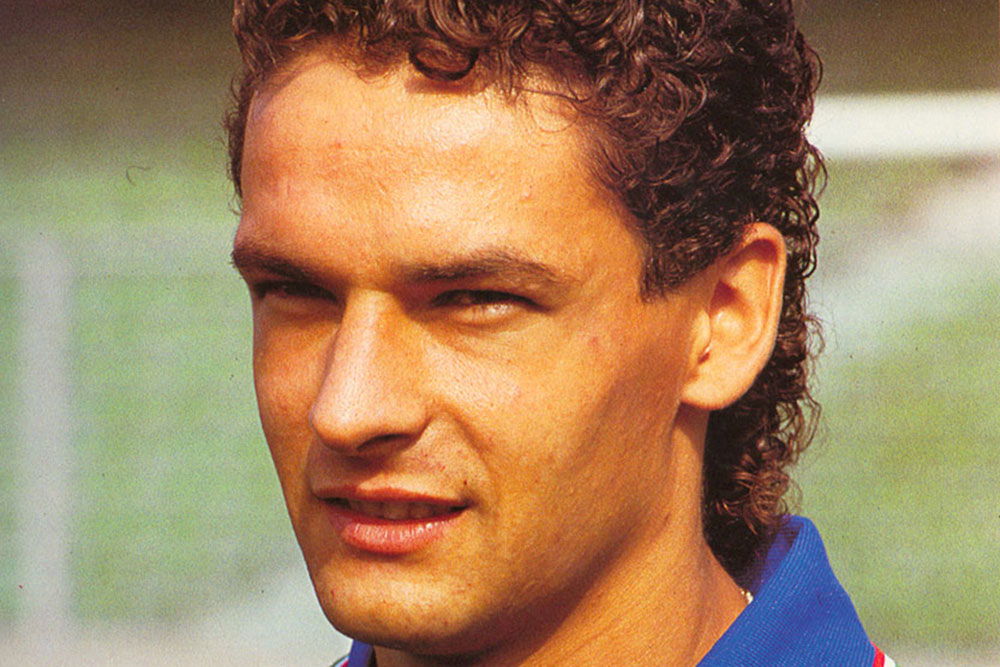
Roberto Baggio was born on February 18, 1967, in Caldogno, a small town in northern Italy. Raised in a large family with seven siblings, Baggio showed an early passion for football, playing for hours on the streets and fields of his hometown with extraordinary flair.
By the age of nine, his talents were so obvious that he was signed by local club Caldogno. Coaches and parents alike marveled at his control, vision and ability to dribble past much older players with confidence and creativity far beyond his years.
At 15, Baggio was recruited by Vicenza, a Serie C1 club, where his rise was meteoric. His performances stunned scouts across the country and soon Fiorentina, one of Italy's top clubs, signed him in 1985.
However, his early career was quickly challenged by a devastating knee injury. He tore both his ACL and meniscus at just 18 years old, requiring multiple surgeries. Doctors doubted he would play again, but Baggio refused to give up.
When Baggio finally stepped onto the pitch for Fiorentina, he became an instant icon. His ability to score from impossible angles, his calm under pressure and his grace on the ball captivated fans.
In Florence, he wasn’t just a player, he was a symbol. In 1990, his transfer to Juventus for a record-breaking fee sparked outrage among Fiorentina supporters. The move was so emotional that riots broke out in the streets.
Roberto Baggio made his World Cup debut in 1990, scoring one of the tournament’s greatest goals against Czechoslovakia. His mazy run past defenders before slotting it calmly into the net remains etched in football history.
Though Italy exited in the semifinals, Baggio’s performances established him as one of the brightest stars in world football. His trademark ponytail, calm demeanor and spiritual depth earned him the nickname "Il Divin Codino", The Divine Ponytail.
The 1994 FIFA World Cup in the United States was both Baggio's greatest triumph and his most painful moment. He carried the ɫ��ɫ team through the knockout rounds, scoring crucial goals against Nigeria, Spain and Bulgaria.
In the final against Brazil, after a goalless draw, the game went to penalties. Exhausted and injured, Baggio stepped up and missed the final penalty, sending the ball over the bar. Italy lost. That miss haunted him, but also solidified his status as a tragic hero.
Following the World Cup, Baggio’s career took him to AC Milan, where he won the Scudetto in 1996. Despite injuries and differences with coaches, he continued to shine whenever fit, combining creativity, intelligence and sportsmanship in every match.
He later played for Bologna, Inter Milan and finally Brescia. At each club, he brought not only goals but a sense of integrity and leadership. His performances at Brescia in the twilight of his career were among the most inspirational comebacks in Serie A history.
After his 1985 injury, Baggio converted to Buddhism, finding strength and peace in his new spiritual path. He often spoke about how chanting and self-reflection helped him through physical and emotional hardships.
He remained deeply private, never seeking the limelight off the pitch. His calm presence, moral clarity and humility endeared him not just to fans but to teammates and opponents alike across the football world.
Roberto Baggio retired in 2004 after scoring over 200 goals in Serie A. He was inducted into the ɫ��ɫ Football Hall of Fame and remains a legend not just for his skill but for his spirit.
He inspired a generation of players, from Alessandro Del Piero to Francesco Totti, and even Lionel Messi has cited him as a childhood hero. Baggio’s story is often taught as a symbol of grace, endurance and excellence.
After retiring, Baggio chose a quiet life away from coaching or television. He bought farmland, raised animals and worked with international humanitarian efforts, especially those focused on poverty and education.
He was appointed as a United Nations Food and Agriculture Organization (FAO) Goodwill Ambassador, showing the same humility and care in charity as he once did in football. His actions spoke louder than any headline.
Roberto Baggio remains one of the most loved figures in football history, not because he was perfect, but because he was human, fragile, passionate and noble.
Whether through dazzling goals, spiritual wisdom or quiet generosity, Baggio’s legacy continues to uplift and inspire people from all walks of life. He is, and will always be, a symbol of beauty in sport and the human condition.